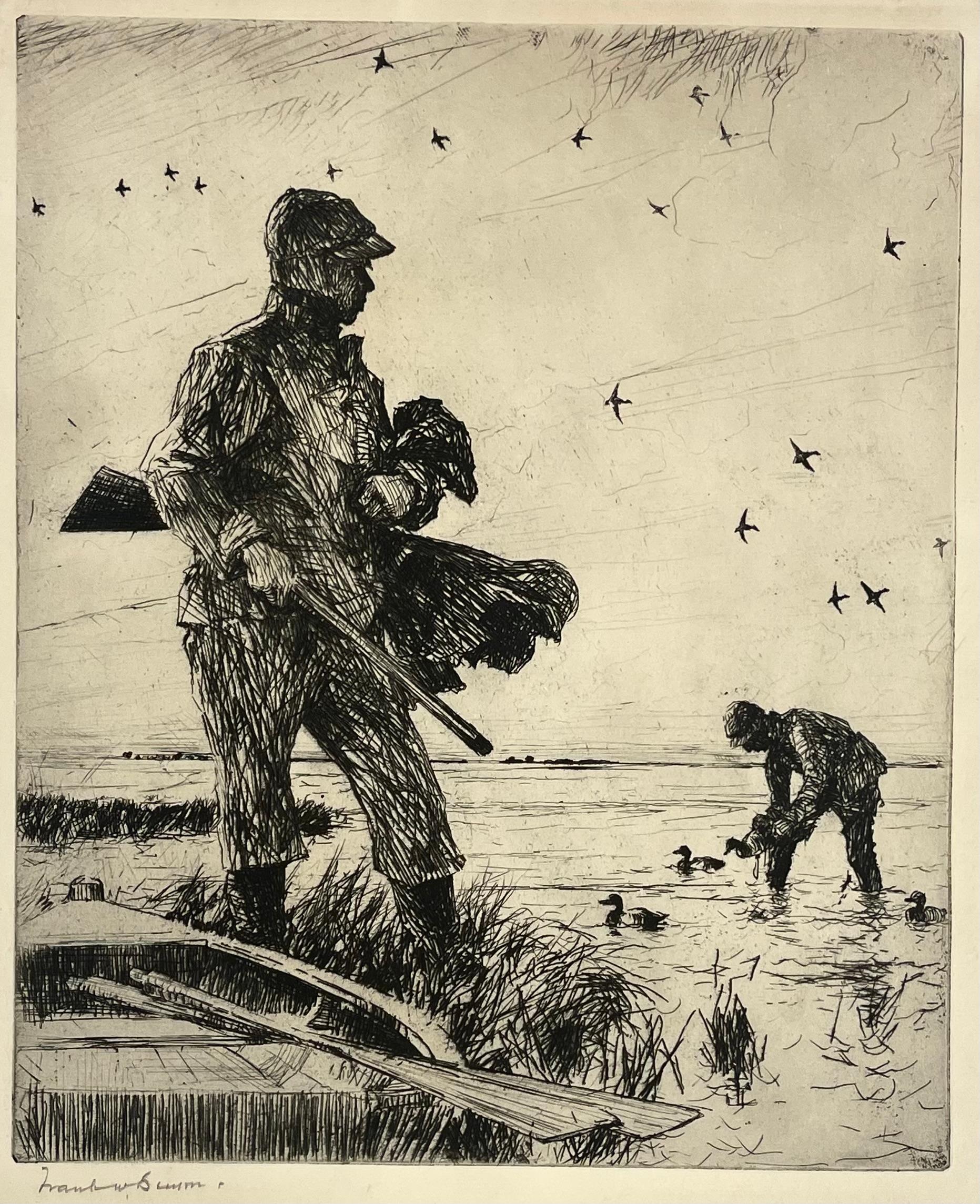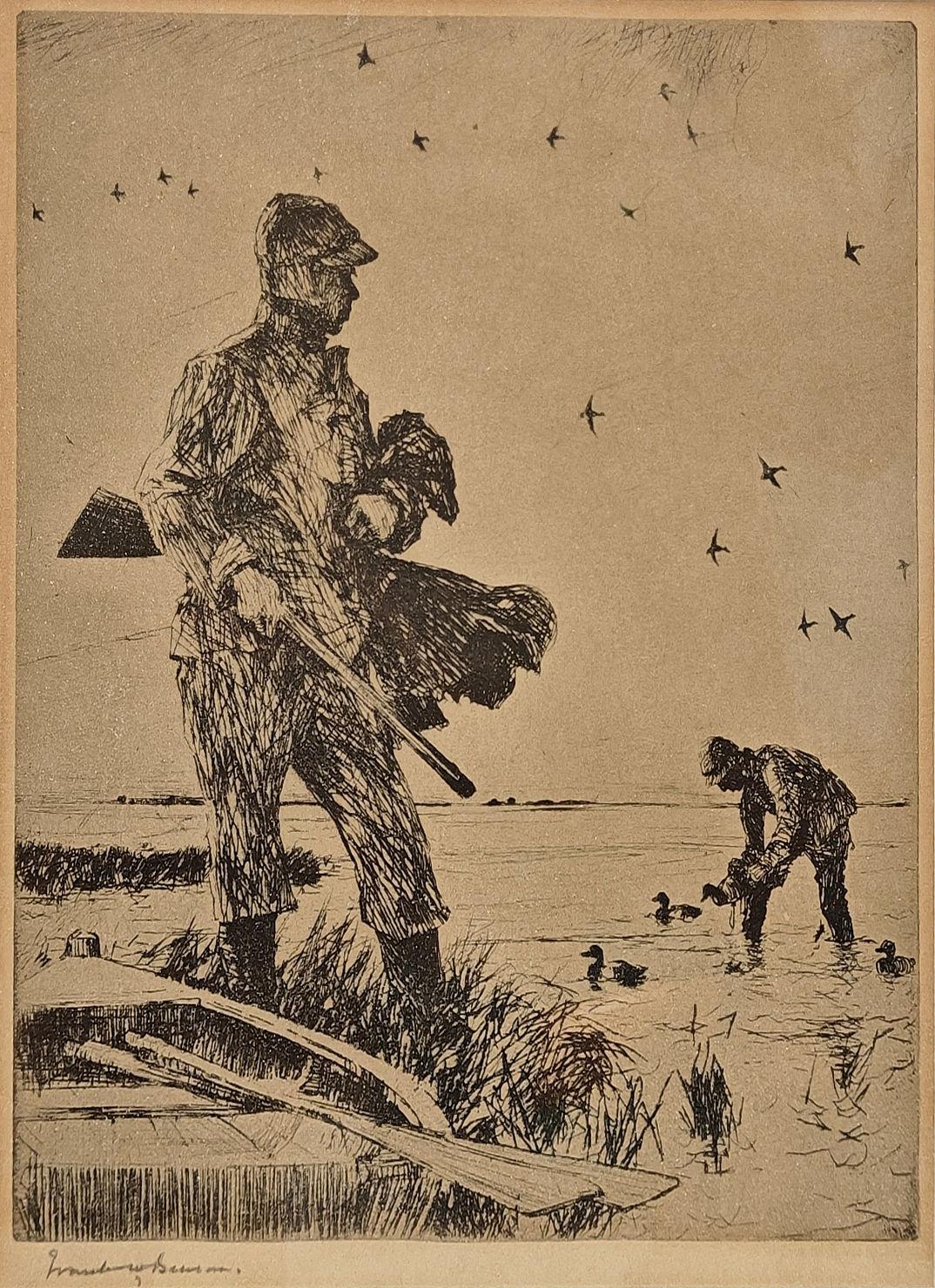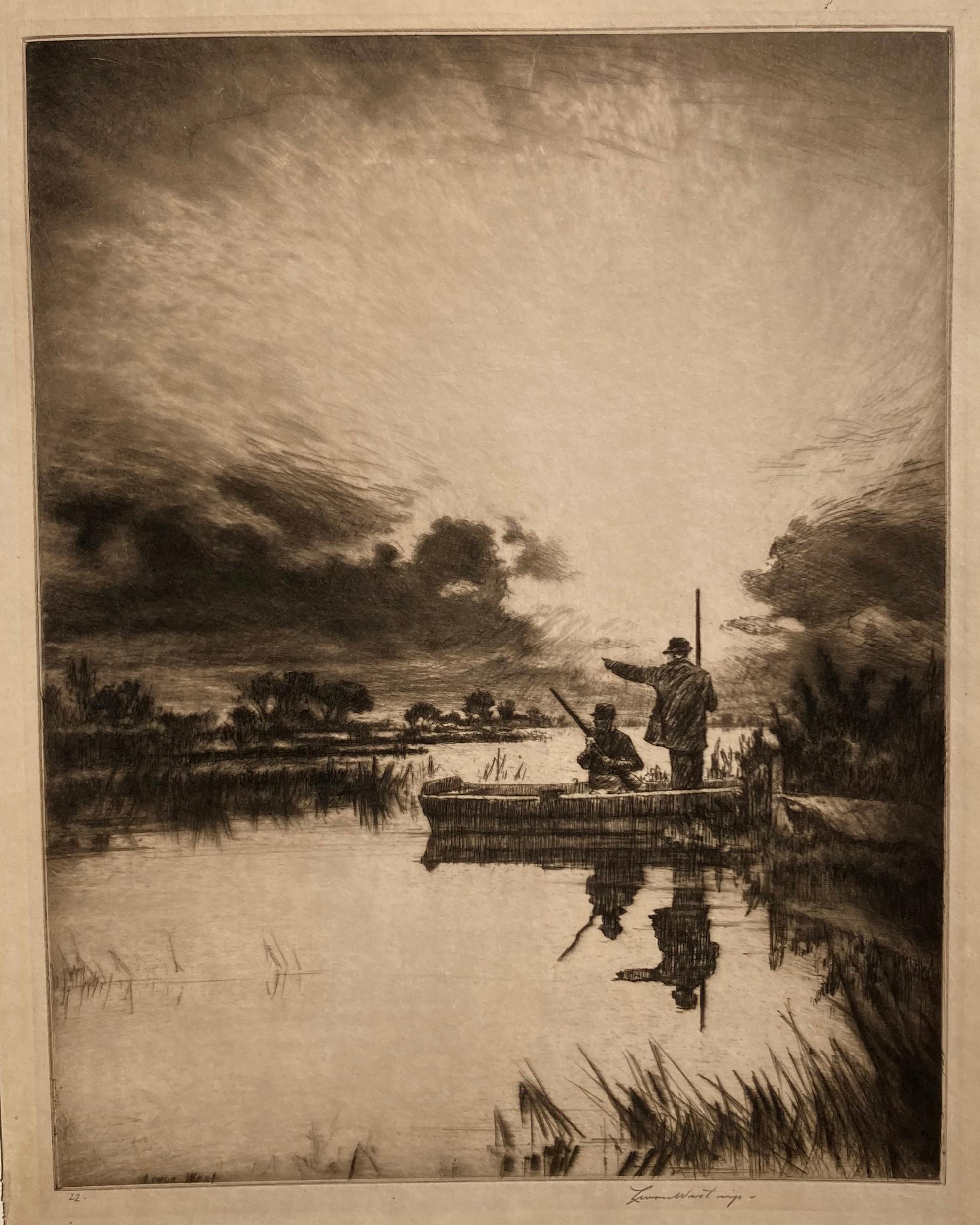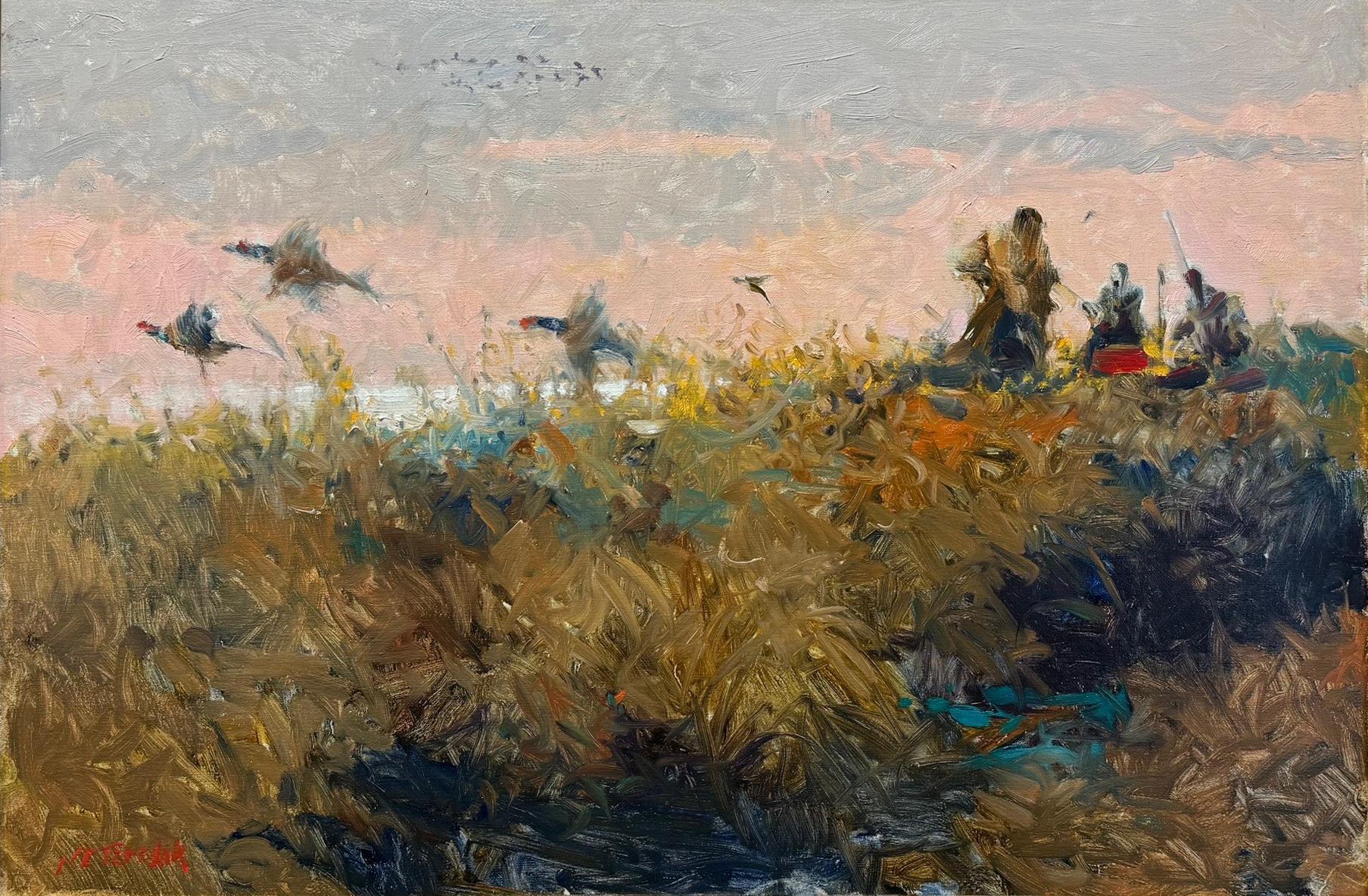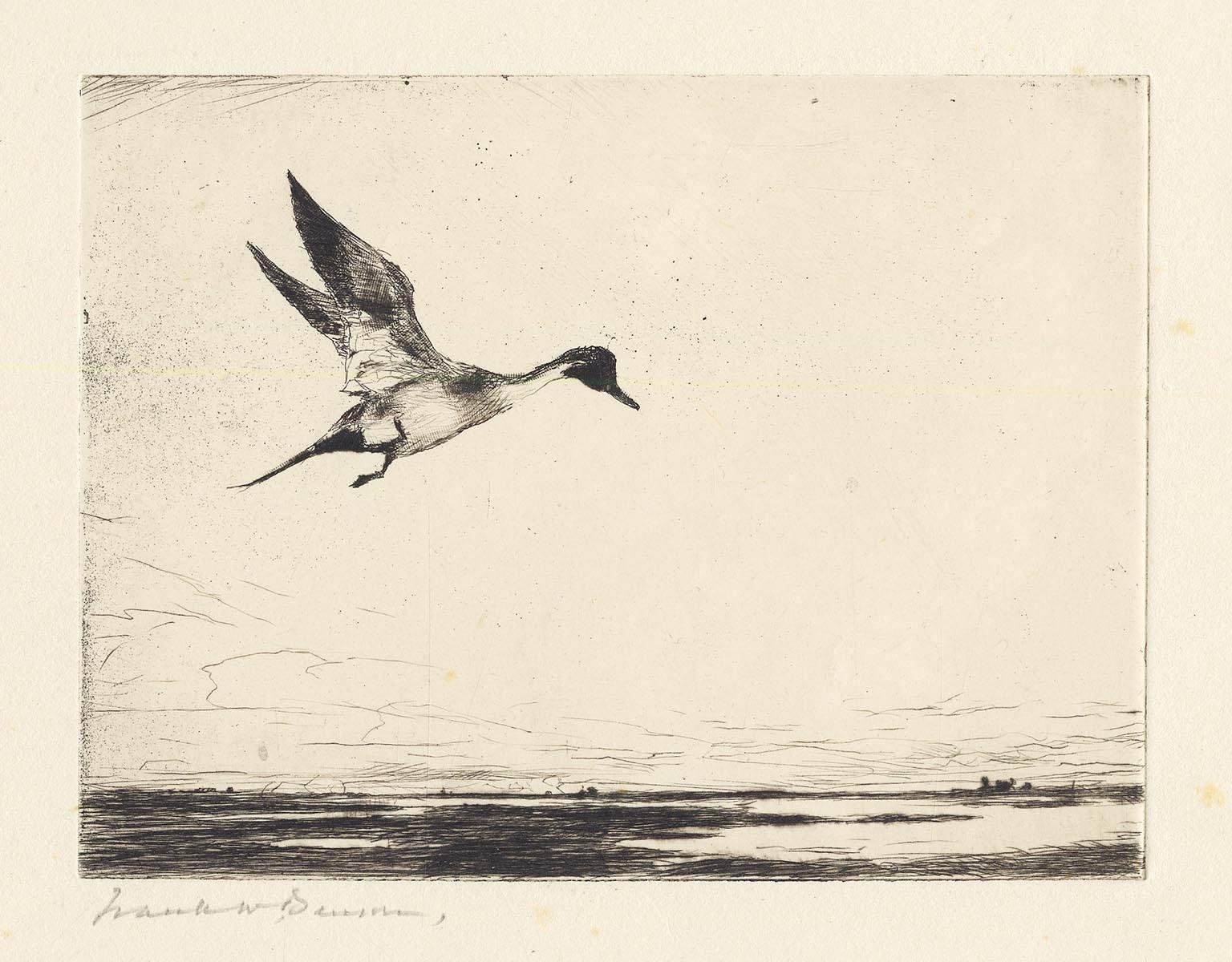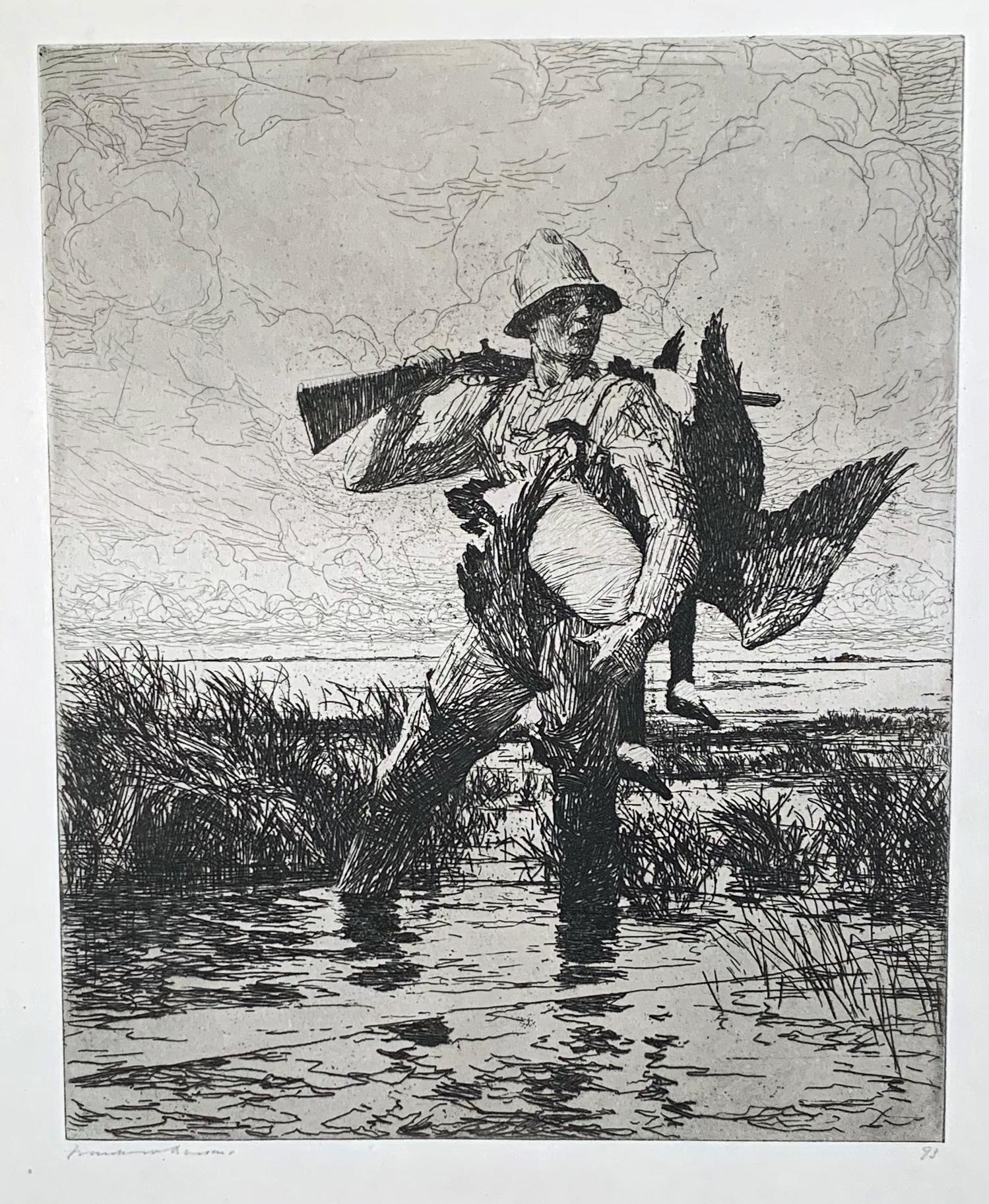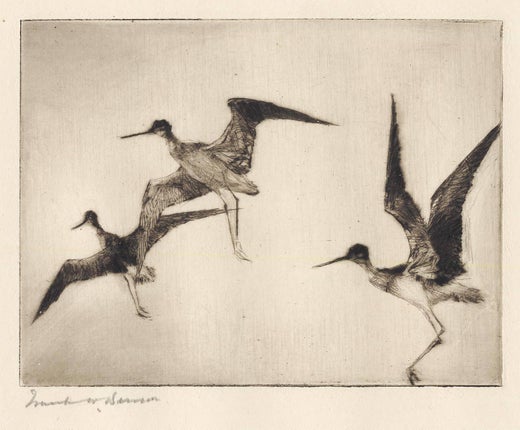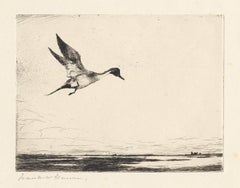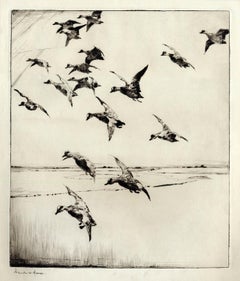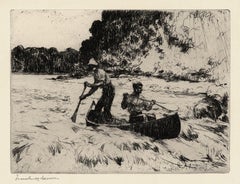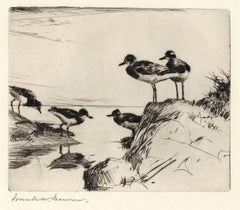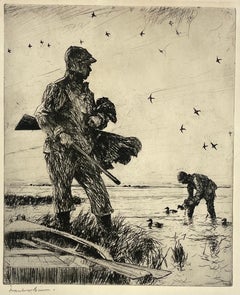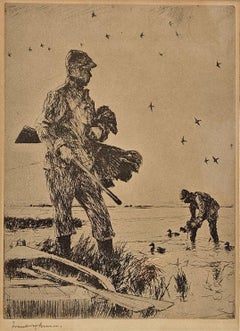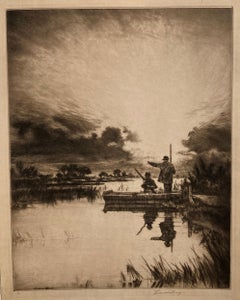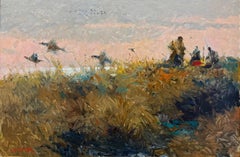Items Similar to Winter Wildfowling
Want more images or videos?
Request additional images or videos from the seller
1 of 10
Frank BensonWinter Wildfowling1927
1927
$11,700
£8,923.95
€10,162.22
CA$16,442.07
A$17,932.39
CHF 9,499.37
MX$214,983.85
NOK 120,979.73
SEK 110,626.99
DKK 75,921.72
About the Item
This 1927 etching by Frank W. Benson is entitled Winter Wildfowling. Printed in an edition of 150 this impression is signed in pencil, lower left. The image size 11 7/8 x 9 7/8" (30 x 24.8 cm) and sheet size 15 1/16 x 12 5/8" (38.3 x 32 cm).
FRANK W. BENSON (1862-1951)
Frank Weston Benson, well known for his American impressionist paintings, also produced an incredible body of prints - etchings, drypoints, and a few lithographs. Born and raised on the North Shore of Massachusetts, Benson, a natural outdoorsman, grew up sailing, fishing, and hunting. From a young age, he was fascinated with drawing and birding – this keen interest continued throughout his life.
His first art instruction was with Otto Grundman at the Museum of Fine Arts in Boston, and then in 1883 in Paris at the Academie Julian where he studied the rigorous ‘ecole des beaux arts’ approach to drawing and painting for two years.
During the early 1880’s Seymour Haden visited Boston giving a series of lectures on etching. This introduction to the European etching revival inspired Benson. He purchased a copy of Maxime Lalanne’s Treatise on Etching using this book as a guide into the nuances of the craft. Benson's first etching was done in 1882. Entitled “Salem Harbor” it was published in The Art Student, the school magazine at the Museum of Fine Arts. Almost three decades would pass before Benson’s busy schedule allowed his fascination with etching and dry-point to weave its way back into the daily structure of his life. He produced over 350 different prints before his death in 1951.
In a letter to his grandson, Frank Benson noted, “I have been happy because my hobby and my work are one and the same, and if you can arrange the same thing in your life, you will be equally happy.”
- Creator:Frank Benson (1976, American)
- Creation Year:1927
- Dimensions:Height: 20 in (50.8 cm)Width: 16 in (40.64 cm)
- Medium:
- Movement & Style:
- Period:
- Condition:Beautiful impression - great diversity of line use.
- Gallery Location:New York, NY
- Reference Number:Seller: #789-21stDibs: LU33123404043
Frank Benson
Born in Salem, Massachusetts, American Impressionist Frank Benson studied at the Museum of Fine Arts in Boston under Otto Grundmann and at the Academie Julian with Gustave Boulanger and Jules Lefebvre. Benson was a founding member of the American Academy of Arts and Letters, Guild of Boston Artists and the ‘Ten American Painters,’ a prestigious group of early impressionists. In 1900, Benson purchased a farm and studio on North Haven Island off the coast of Maine. It was there that his style became increasingly impressionistic. Benson is credited with being known as one of the outstanding 20th-century wildlife printmakers. Benson was a member of the Boston Art Club, National Academy of Design, Society of American Artists and Guild of Boston Artists. He exhibited at the World’s Columbian Exposition in Chicago, Exposition Universelle in Paris, Lousiana Purchase Exposition in St. Louis and the Panama Pacific Exhibition in San Francisco, as well as at the Art Institute of Chicago, Corcoran Gallery, Carnegie Institute, International and Pennsylvania Academy of Fine Arts. Benson’s works are held in numerous public and private collections, including the National Gallery of Art, Smithsonian American Art Museum, Museum of Fine Arts, Worcester Art Museum and Metropolitan Museum of Art.
About the Seller
4.7
Recognized Seller
These prestigious sellers are industry leaders and represent the highest echelon for item quality and design.
Established in 1898
1stDibs seller since 2015
59 sales on 1stDibs
Associations
International Fine Print Dealers Association
- ShippingRetrieving quote...Shipping from: New York, NY
- Return Policy
More From This Seller
View AllLone Pintail.
By Frank Benson
Located in New York, NY
This drypoint from 1930 was printed in an edition of 150. It is signed in pencil just under the image in the lower left. Listed in the catalogue raisonne on Frank W. Benson by Adam Paff #303.
Frank Weston Benson (1862-1951), well known for his American impressionist paintings, produced an incredible body of prints - etchings, drypoints, and a few lithographs. Born and raised on the North Shore of Massachusetts, Benson, a natural outdoorsman, grew up sailing, fishing, and hunting. While a teenager his fascination with drawing and birding developed simultaneously and continued throughout his life.
His first art instruction was with Otto Grundman at the Museum of Fine Arts in Boston, and then in 1883 in Paris at the Academie Julian where he studied the rigorous ‘ecole des beaux arts’ approach to drawing and painting for two years.
During the early 1880’s Seymour Haden visited Boston giving a series of lectures on etching. This introduction to the European etching...
Category
1930s American Realist More Prints
Materials
Drypoint
Here They Come !
By Frank W. Benson
Located in New York, NY
This impression of "Here They Come !" is from the fourth state of eight. There are six known impressions of the fourth state. Edition 150 (final state). It is signed in pencil in the lower left and inscribed "D-1". The image size 13 7/8 x 11 3/4" (34.6 x 28.8 cm) and sheet size 16 3/4 x 14 5/8" (42.8 x 37.1 cm).
FRANK W. BENSON (1862-1951)
Frank Weston Benson, well known for his American impressionist paintings, also produced an incredible body of prints - etchings, drypoints, and a few lithographs. Born and raised on the North Shore of Massachusetts, Benson, a natural outdoorsman, grew up sailing, fishing, and hunting. From a young age, he was fascinated with drawing and birding – this keen interest continued throughout his life.
His first art instruction was with Otto Grundman at the Museum of Fine Arts in Boston, and then in 1883 in Paris at the Academie Julian where he studied the rigorous ‘ecole des beaux arts’ approach to drawing and painting for two years.
During the early 1880’s Seymour Haden visited Boston giving a series of lectures on etching. This introduction to the European etching...
Category
1920s American Impressionist More Prints
Materials
Drypoint
Running the Rapids
By Frank Benson
Located in New York, NY
The etching "Running the Rapids" was created by Frank Benson in 1927. Printed in an edition of 150, this impression is signed in pencil, lower left. The image size is 5 13/16 x 7 7/8" (14.8 x 20 cm) and sheet size 8 1/16 x 10 5/16" (20.3 x 26.2 cm).
Frank Weston Benson (1862-1951), well known for his American impressionist paintings, also produced an incredible body of prints - etchings, drypoints, and a few lithographs. Born and raised on the North Shore of Massachusetts, Benson, a natural outdoorsman, grew up sailing, fishing, and hunting. From a young age, he was fascinated with drawing and birding – this keen interest continued throughout his life.
His first art instruction was with Otto Grundman at the Museum of Fine Arts in Boston, and then in 1883 in Paris at the Academie Julian where he studied the rigorous ‘ecole des beaux arts’ approach to drawing and painting for two years.
During the early 1880’s Seymour Haden visited Boston giving a series of lectures on etching. This introduction to the European etching...
Category
1920s American Impressionist Figurative Prints
Materials
Etching
Study of Turnstones.
By Frank Benson
Located in New York, NY
Frank Benson made this drypoint in 1928. The second state of two.
A scarce print with no recorded printings of the second state - presumably, at least two were printed. The image size is 4 7/8 x 5 7/8" (12.4 x 14.9 cm). #282 in the Frank W. Benson catalogue raisonne by Adam Paff.
Frank Weston Benson (1862-1951), well known for his American impressionist paintings, produced an incredible body of prints - etchings, drypoints, and a few lithographs. Born and raised on the North Shore of Massachusetts, Benson, a natural outdoorsman, grew up sailing, fishing, and hunting. While a teenager his fascination with drawing and birding developed simultaneously and continued throughout his life.
His first art instruction was with Otto Grundman at the Museum of Fine Arts in Boston, and then in 1883 in Paris at the Academie Julian where he studied the rigorous ‘ecole des beaux arts’ approach to drawing and painting for two years.
During the early 1880’s Seymour Haden visited Boston giving a series of lectures on etching. This introduction to the European etching...
Category
Early 20th Century American Realist More Prints
Materials
Drypoint
Over Cape Cod
By Frank W. Benson
Located in New York, NY
"Over Cape Cod" is an etching created by Frank W. Benson in 1932. Benson only printed trial proofs of this plate - there is no edition. This impression is a first state of four. There are six impressions of the first state, three impressions of the second, four impressions of the third, and eight of the fourth state have been recorded. Signed in pencil in the lower left under the image. The image size is 7 15/16 x 14 7/8" (20.1 x 37.8 cm) and sheet size 11 9/16 x 18 3/8" (29.3 x 46.7 cm).
FRANK W. BENSON (1862-1951)
Frank Weston Benson, well known for his American impressionist paintings, also produced an incredible body of prints - etchings, drypoints, and a few lithographs. Born and raised on the North Shore of Massachusetts, Benson, a natural outdoorsman, grew up sailing, fishing, and hunting. From a young age, he was fascinated with drawing and birding – this keen interest continued throughout his life.
His first art instruction was with Otto Grundman at the Museum of Fine Arts in Boston, and then in 1883 in Paris at the Academie Julian where he studied the rigorous ‘ecole des beaux arts’ approach to drawing and painting for two years.
During the early 1880’s Seymour Haden visited Boston giving a series of lectures on etching. This introduction to the European etching...
Category
Mid-20th Century American Impressionist Figurative Prints
Materials
Etching
On the Kedgwick
By Frank Benson
Located in New York, NY
Frank Benson created the etching "On the Kedgwick" in 1923, in an edition of 150. This impression is the second state of four. There are five known impressions of the second state. It is signed in pencil and inscribed "B-1" and "1 or 5" at the lower left paper edge (pencil). The image size 7 13/16 x 11 7/8" (19.9 x 30.2 cm) and sheet size 15 3/8 x 11 1/2" )29.3 x 39 cm). It is listed in the Frank W. Benson catalogue raisonne by Paff #222.
FRANK W. BENSON (1862-1951)
Frank Weston Benson, well known for his American impressionist paintings, also produced an incredible body of prints - etchings, drypoints, and a few lithographs. Born and raised on the North Shore of Massachusetts, Benson, a natural outdoorsman, grew up sailing, fishing, and hunting. From a young age, he was fascinated with drawing and birding – this keen interest continued throughout his life.
His first art instruction was with Otto Grundman at the Museum of Fine Arts in Boston, and then in 1883 in Paris at the Academie Julian where he studied the rigorous ‘ecole des beaux arts’ approach to drawing and painting for two years.
During the early 1880’s Seymour Haden visited Boston giving a series of lectures on etching. This introduction to the European etching...
Category
1920s Impressionist Figurative Prints
Materials
Etching
You May Also Like
WINTER WILDFOWLING
By Frank Benson
Located in Portland, ME
Benson, Frank. WINTER WILDFOWLING. Etching, 1927. Paff 265. Edition of 150. Signed in pencil, lowwer left. 11 7/8 x 9 7/8 inches (plate), 14 1/2 x 12 1/2 inches (sheet). Printed on W...
Category
1920s Figurative Prints
Materials
Etching
"Winter Wildfowling" Frank Weston Benson, Hunting Scene, Outdoors, Marshes
By Frank Weston Benson
Located in New York, NY
Frank Weston Benson
Winter Wildfowling, 1927
Signed lower left
Etching on paper
Image 8 1/2 x 7 inches
Born in Salem, Massachusetts, a descendant of a long line of sea captains, Benson first studied art at Boston’s Museum School where he became editor of the student magazine. In 1883, Benson enrolled at the Académie Julian in Paris where artists such as Bouguereau, Lefebvre, Constant, Doucet and Boulanger taught students from all over Europe and America. It was Boulanger who gave Benson his highest commendation. “Young man,” he said, “Your career is in your hands . . . you will do very well.” Benson’s parents gave him a present of one thousand dollars a twenty-first birthday and told him to return home when it ran out. The money lasted long enough to provide Benson with two years of schooling in Paris, a summer at the seaside village of Concarneau in Brittany and travel in England.
Upon returning to America, Benson opened a studio on Salem’s Chestnut Street and began painting portraits of family and friends. An oil of his wife, Ellen Perry Peirson, dressed in her wedding gown is representative of this period. It demonstrates not only the academic techniques he learned at the Academie Julian but also his own growing emphasis on the effects of light. And yet, despite all the technical mastery displayed in the work, the painting exudes the warmth that existed between model and artist. More than a likeness, it is a study in serenity. Perhaps it was of a work such as this that Benson was thinking when he said, “The more a painter knows about his subject, the more he studies and understands it, the more the true nature of it is perceived by whoever looks at it, even though it is extremely subtle and not easy to see or understand. A painter must search deeply into the aspects of a subject, must know and understand it thoroughly before he can represent it well.”
Following a brief stint as an instructor at the Portland, Maine, Society of Art, Benson was appointed as instructor of antique drawing at the Museum School in Boston in the spring of l889. Benson’s long association with the school was particularly fruitful. Under the leadership of Edmund Tarbell and Benson the Museum School became a national and internationally recognized institution. The students won numerous prizes, enrollment tripled, a new school building was erected and visiting delegations from other schools sought the secret of their success. Benson cherished his role as teacher and was held in high esteem by his students, many of whom called him “Cher Maitre.” Reminiscing about his long career with the school Benson once said, “I may have taught many students, but it was I who learned the most.”
In 1890, Benson won the Hallgarten Prize at the National Academy in New York. It was the first of a long series of awards, that earning for him the sobriquet “America’s Most Medalled Painter.” In the early years of his career, Benson’s studio works were mostly portraits or paintings of figures set in richly appointed interiors. Young women in white stretch their hands out towards the glow of an unseen fire; girls converse on an antique settee in a room full of objets d’arts; his first daughter, Eleanor, poses with her cat. Works of this sort, together with a steady influx of portrait commissions, earned Benson both renown and financial rewards, yet it was in his outdoor works that gave Benson his greatest pleasure.
In the latter half of the 1890s, Benson summered in Newcastle, on New Hampshire’s short stretch of seacoast. It was here, in 1899, that Benson made his first foray into impressionism with Children in the Woods and The Sisters, the latter a sun-dappled study of his two youngest daughters, Sylvia and Elisabeth.
This painting was one of the first works that Benson hung at an exhibition with nine friends. The resignation of these ten illustrious artists rocked the American art establishment but, the catalogue for their first exhibition was titled, simply, “Ten American Painters.” When, in 1898, the three Bostonians and seven New Yorkers began to exhibit their best work in exquisitely arranged small shows, the group (dubbed by newspapers, “The Ten” ) quickly became known as the American Impressionists, a bow to the style of their French predecessors. The Ten’s annual shows soon became an eagerly awaited part of the annual exhibition calendar and were always well reviewed. Held annually in New York City, the group’s yearly exhibitions usually traveled to Boston and were occasionally seen in other cities. Benson’s association with other members of the group such as Childe Hassam, Thomas Dewing, William Merrit Chase and J. Alden Weir, only reinforced his growing emphasis on the tenets of Impressionism. As he later said to his daughter Eleanor, “I follow the light, where it comes from, where it goes.”
The principles of Impressionism began to dominate Benson’s work by 1901, the year that the Bensons first summered on the island of North Haven in Maine’s Penobscot Bay. His summer home “Wooster Farm,” which they rented and finally bought in 1906, became the setting for some of Benson’s best known work and there, it seemed, he found endless inspiration. Benson’s sparkling plein-air paintings of his children–Eleanor, George, Elisabeth and Sylvia–capture the very essence of summer and have been widely reproduced: In The Hilltop, George and Eleanor watch the sailboat races from the headland near their house.
As a boy, Benson dreamed of being an ornithological illustrator. In mid-life, he returned to the wildfowl and sporting subjects that had remained his lifelong passion. Using etching and lithography, watercolor, oil and wash, Benson portrayed the birds observed since childhood and captured scenes of his hunting and fishing expeditions.
Together with his two brothers-in-law, Benson bought a small hunting retreat on a hill overlooking Cape Cod’s Nauset Marsh. Here, in the late 1890s, he began experimenting with black and white wash drawings. These paintings became so popular that Benson was not able to keep up with the demand. He turned to an art publishing company to have several made into it intaglio prints; twelve wash drawings are known to have been reproduced in this manner. At least two of them were given as gifts to associate members of the Boston Guild of artists, of which Benson was a founding member.
Benson was also an avid fisherman and his salmon fishing expeditions to Canada’s Gaspé Peninsula where one of the high points of his summer. There, in 1921, he began the first in a series of watercolors that would eventually over 500 works.
Benson’s watercolors conveyed the joy and beauty of a sportsman’s life whether in a painting of a hunter setting out decoys, a flock of ducks coming in for a landing or a grouse flushed from cover. The critics favorably compared Benson’s watercolors to those of Homer. “The love of the almost primitive wilderness which appears in many of Homer’s landscapes and the swift, sure touch with which he suggests rather than describes–these also characterize Benson’s work,” one critic wrote. “The solitude of the northern woods is very much like Homer’s.”
Like the wash drawings before them, Benson’s watercolors proved...
Category
1920s Academic Animal Prints
Materials
Paper, Etching
(HUNTERS WITH REFLECTIONS) - RICH IMPRESSION
By Levon West
Located in Santa Monica, CA
LEVON WEST (1900 - 1968)
(Untitled) - HUNTERS with REFLECTIONS. ca 1925
Etching, signed and numbered 22, lower left. Plate, 13 1/2 x 10 1/2 inches. Sheet 15 3/4 x 11 3/4 inches. ...
Category
1920s American Impressionist Landscape Prints
Materials
Etching
$600 Sale Price
29% Off
Pheasant Hunting
By John Terelak
Located in Greenwich, CT
John Terelak Biography
American, b. 1942
John Charles Terelak is recognized as one of America's finest living impressionists. Born in Boston, Massachusetts, he received formal art i...
Category
2010s American Impressionist Landscape Paintings
Materials
Canvas, Oil
MARSH GUNNER
By Frank Benson
Located in Portland, ME
Benson, Frank. MARSH GUNNER. Paff 149. Etching, 1918. Edition of 150. Signed in pencil, lower left, and numbered "93" in pencil, lower right. 10 7/8 x 8 7/8 inches (plate), 15 3/4 x ...
Category
1910s Figurative Prints
Materials
Etching
The Punter
By Frank Benson
Located in New York, NY
A superb, richly-inked impression of this etching. Edition of 150. Signed in pencil, lower left.
Category
1920s American Impressionist Abstract Prints
Materials
Etching
More Ways To Browse
Vintage Filipino Posters
Vintage Fitness Posters
Vintage Hockey Posters Prints
Vintage Posters Barcelona
Vintage Posters Wengen
Vintage Railway Carriages
Vintage Rolex Poster
Vintage Showgirls Art
Vintage Sugar Poster
Vintage Us Army Posters
Wiesbaden Poster
Yoko Ono Imagine Peace
York Railway Poster
Yoshitomo Nara Real One
1965 Salvador Dali Prints
Aboriginal Art Print
Alaska Poster
Albertus Seba Coral Print
